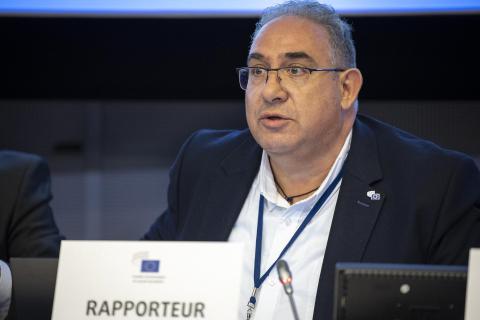European Economic
and Social Committee
From waste to resource: the EU must strengthen circularity in waste management
Recycling and the recovery of strategic raw materials from waste should be stepped up, says the European Economic and Social Committee (EESC). This would reduce the waste going to landfill, but would also help the EU to lessen its dependence on third countries for raw materials.
While the European Union’s primary objective should be to reduce the amount of waste produced through prevention and an emphasis on reusability, another priority essential to a sustainable economy should be to treat waste as a mix of raw materials that has not yet been properly sorted and treated, recognising that this can be done. Putting forward these arguments in its opinion From waste plants to resource plants adopted at its October plenary session, the EESC calls for a debate at EU level on waste management and the implementation of a revised strategy to place greater emphasis on the recycling and recovery of raw materials. Waste is set to become an increasingly important source – and, in the longer term, the only source – of critical raw materials for the European economy, especially as virgin raw material resources are getting depleted and geopolitical tensions may make it more difficult for the EU to import them.
Under the current Waste Framework Directive, landfill is deemed to be the ‘last resort’ (followed by incineration) for waste management. However, many Member States are very keen on this solution, even though, as the EESC points out, indiscriminate landfilling risks destroying valuable materials and nutrients that could be recovered. To remedy this, the EESC is calling on the EU to promote innovative recovery technologies and regulatory solutions to encourage a shift from the disposal of unsustainable materials to the production of high-quality secondary materials. In addition, the EESC advocates maximising nutrient recovery from wastewater, sewage sludge and other resources through best practice treatment, recycling and resource recovery methods aimed at recovering valuable materials.
Future waste legislation, at both EU and Member State level, should recognise the systemic contribution of resource plants, support the recovery of resources from waste and classify facilities such as resource recovery plants and waste water treatment plants as resource hubs, which provide not only heat, electricity and water, but also captured carbon, nutrients, recovered metals and organic materials as an alternative to virgin materials. The Member States must seek to absorb as much EU funding as possible and steer investment towards a circular economy.
The EESC argues that a number of regulatory barriers need to be removed in order to implement the ‘waste to resource shift’ and achieve a fully circular economy. It recommends that EU legislation prohibiting the use of recycled raw materials and recovered nutrients in various sectors, including agriculture/organic farming, livestock, aquaculture, etc., be reviewed in close consultation with industry. Regulation should prioritise product quality over origin, and market conditions need to be adjusted to create a level playing field between recycled and virgin materials. In addition, the EESC calls for the European Investment Bank’s funding for waste management to be increased and, in particular, for priority to be given to investments that support integrated resource recovery from waste. At the same time, the EESC urges the EU institutions to introduce harmonised fines in all Member States to combat illegal waste activities. The EESC calls for EU-level oversight to tackle infringements and streamline the product chain for future investment.
Embracing this paradigm shift in waste management represents a major opportunity for the EU labour market. It is estimated that an additional 50 000 jobs could be created in waste management alone if the green economy is fully implemented. Upskilling and re-skilling will be necessary for workers in the waste management sector to adapt to new technologies. Adequate investment in human capital infrastructure must be ensured, with the full involvement of the social partners. In addition, the re-evaluation of the EU’s approach to waste management will have a direct impact on the need for additional education and training of the workforce. This includes raising workers’ awareness of sustainability principles and innovative technologies, as well as an increased focus on health and safety principles. A robust social dialogue in the sector can facilitate a common understanding of these requirements.
The EESC believes that information campaigns should be promoted and funded to inform EU citizens about waste prevention, producer responsibility and environmental protection. Educating the public about waste management, recycling and the circular economy will bring about essential changes in behaviour.
